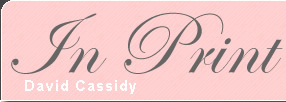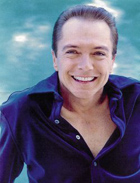
Gig Magazine
Is David Cassidy Really Gettin' It On In The Streets?
Mick Ronson Knows ...
February 1977
By Jim Farber
As the afternoon sun splatters haphazard streams of light and shadows throughout the living room of Mick Ronson's brightly decorated apartment just off Park Avenue South, David Cassidy sits yoga-style, practicing eye-squinting techniques. For David, the squinting seems to imply a double meaning. Besides shielding the sun from his eyes, it somehow makes him look dazed. His eyes now seem watery, more distant - making him look incredibly stoned. I mention this to Cassidy and he's quick to' act' the part, feigning your favorite rocker's coked-out stupor.
David garbles: 'Yeah, now don't I look like a rock star?'
Still Trying To Be Real
Well, not quite. Dressed in cutesy, painted-on leather pants and black top, cut low to reveal a hairless chest, David, at 26, still looks 16. He's pretty but not sexy - kinda like Mia Farrow in the '74 version of The Great Gatsby. Yet his pale complexion and dangerously fragile body give him an air of vulnerability, explaining his canonization by pre-pubescent girls with imitative mothering instincts. As much as David's 'hot pix' physical profile ties him to his screamy bopper past, the very fact that Cassidy is speaking to me in Mick Ronson's apartment should tell you something about the direction he wants his music to move in.
Strange and terrifying as it sounds, a union of Cassidy and Ronson may give David the chance to come out looking like 'a reel live rock star' after all. One can only wonder, then, what cosmic muck-up could have joined these two polar opposites in what may turn out to be the most destructive merger since Paul and Linda McCartney. 'Well, I found out through a mutual friend that Mick wanted to produce me', begins Cassidy in a slow, studied drawl. 'It was right after I left The Partridge Family and he told Tony Defries, who was managing Bowie at the time, and somehow Bowie found out and so Bowie called me and said 'I wanna produce you'. And then I had a meeting with Bowie and he finally led me to Suzi (Mick's lady) and eventually I wound up playing with Mick'.
Perfect Union?
The result of this glorious mismatch is the single and title song off Cassidy's latest album, Gettin' It In The Streets. Cassidy had been, recording the album out at the Caribou Ranch with such notables as session man Ricky Fataar and America's pretty boy Gerry Beckley, when Mick finally made it out then to add his guitar on several tracks, most notably the single. 'When me and Mick played together I blew him away with my guitar and he blew me away with his. But I told him flat out I didn't think it was good the way he would just play one thing'. (David illustrates by imitating the sound of Ronson's pile-driving style). I know he's capable of doing so much more. My music may be essentially different than his but when we play together on the album there's a nice mingling'.
To make his point perfectly clear, Cassidy whips out a tape of the single and dashes over to the nearest player, delivering his newborn sound at the customary ear bleed level. Fifteen seconds into the cut, a soupy piano is thankfully pounced upon by heavy drums and a slamming rhythm guitar. Then comes Cassidy's voice - it sure don't sound like the twit who sang 'I Think I Love You'. He now goes for a forced grittiness with his voice, doubtlessly drawing giggles from all who remember his wimpy Keith Partridge incarnation. David's trying to sound tortured and real and it isn't working. But then the riff starts to catch hold and the beat's real good. And when Ronson's guitar comes screaming in like a pack of demented whooping cranes in heat, the cut's saved and I feel my cynical smirk turn into a smile. This may work! But Cassidy is quick to stress the tenuousness of the relationship - especially when it comes to touring. 'We're playing together now, sure, but the road is another story. I wouldn't go out and play live unless I felt things were really great because can't afford to make any mistakes, even though I don't need to do this. I have enough money. I don't have to do anything I don't wanna do. Mick can't afford to do anything less than incredible either. We have to get it right for the road, otherwise we'll look like a couple of schmucks. Because people are gonna come and they're gonna want to hate it or love it, or they're gonna come and say 'God damn, what could that be?' I mean, from what I was and what Mick was, we're like opposite ends of the spectrum. But Mick said to me last night, 'There's really no difference. We essentially play the same stuff, otherwise we couldn't be playing together as much as we have.'
More Than Looks As A Common Bond
Actually, taking a closer look at the careers of these two wayward stars, it seems they may have more in common than one originally might have guessed. Besides the fact that both are pretty boys, each has had his share of identity problems lately. Though Ronson wasn't around for the interview, his problems speak for themselves. Since leaving Bowie in '73, the muscular guitarist has gone from Mott The Hoople to Ian the Hunter to The Rolling Thunder ballyhoo to Roger McGuinn, and more recently, to anybody who happens to play anything resembling an instrument anywhere in the New York area. Just this fall, he's done stints, with Lou Reed, Rob Stoner, The Alpha Band, and even under-grounder Mary Hogan. Now, you know all this local gigging isn't Ronson's way of compiling a rock n' roll resume. The truth is Ronson needs time to find himself. RCA-recently dumped him after three commercially dismal LPs, his attempted union with Roger McGuinn in Thunderbyrd failed to gel, and so the prospect of forming a band with someone whose major claim to fame is that he used to be the star of what was, perhaps the only prime time show more offensive than The Brady Bunch, doesn't seem so far fetched.
Cassidy's predicament is (at least in his eyes) substantially less traumatic. Remarkably, the man who brought us enough bubblegum to choke a class full of seventh graders doesn't feel it'll be a difficult challenge to change his 'nerd' image. 'The whole think in changing an image is not changing an image. It's just evolving. And I think this album is the biggest step I've taken. It's the best I've made - I know that in my gut. It's just good music that changes people's minds'.
Actually, this is Cassidy's third try to change the public's view. The Higher They Climb and Home Is Where The Heart Is, both on RCA, are two embarrassing records which began the evolution of David's new style. Their poor sales showed that not only was he unable to capture a new rock audience, but even the kiddies who previously gave him five gold records wouldn't touch the stuff. With the reality of the long hard climb ahead, Cassidy admits that acting may once again be in his future.
'I'd like to do more of that, definitely. I've turned down an awful lot of films and I don't even look at TV shows - it's just too mediocre. I'd like a part that lets me grow - something that has some style. I don't wanna do a shitty movie and I don't wanna do s shitty album, I'm sick of shitty things!'
Meanwhile, with both Ronson and Cassidy up the provincial creek, David seems to feel this new union may give them both the paddle they need. 'I want to get back to an audience. It'll be great if it works out between me and Mick. We'd be aiming for everyone. For my part, I don't feel I have to overcome anything. I've evolved and people have to accept me for what I am, that's all.'
